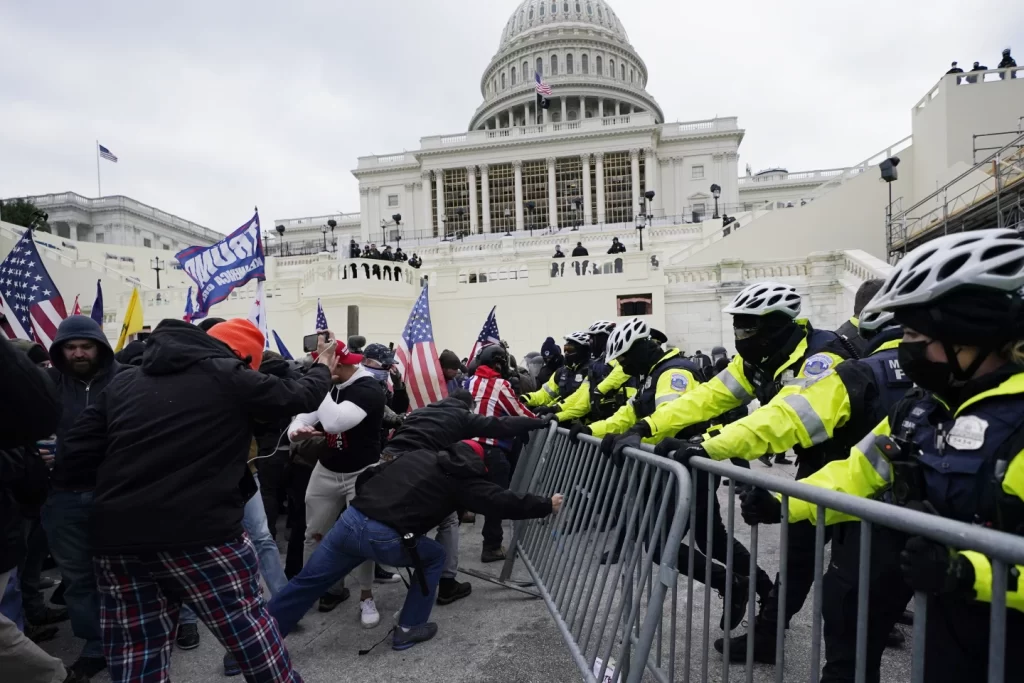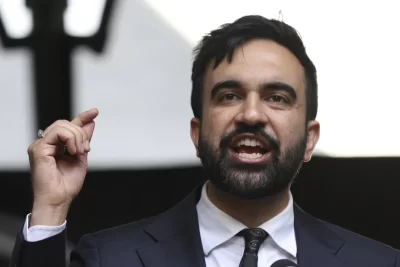
CHARLESTON, W.Va. — For Derrick Evans, being part of the mob that stormed the U.S. Capitol wasn’t enough. The former West Virginia lawmaker wants to make his path to the halls of Congress permanent.
On the other side of the metal barricades that day, Police Officer Harry Dunn couldn’t stand what he saw as he defended the Capitol and its inhabitants from rioters on Jan. 6, 2021. Ultimately, the Maryland resident watched lawmakers he had protected vote to acquit former President Donald Trump and deny the violence and trauma that led to the deaths of some of his fellow officers.
On Tuesday, Evans and Dunn will make bids for U.S. House seats in their respective state primaries. They come into the election with dramatically different interpretations about what happened that day, and their performance in Tuesday’s primaries in West Virginia and Maryland could hint at whether voters’ opinions about the attack and its meaning have changed over time.
In terrorizing the Capitol for an entire afternoon, rioters wielded pipes, bats and bear spray. They used flagpoles as weapons, brutally beat police officers, chanted that they wanted to hang Vice President Mike Pence, broke through the glass and busted through doors as lawmakers frantically evacuated. A Georgia man bragged that he “fed” a police officer to the mob. More than 100 police officers were injured, many beaten and bloodied. At least nine people who were there died during and after the rioting, including a female rioter who was shot and killed by police.
More than 1,350 people have been charged with federal crimes related to the Capitol riot. Over 850 of them have been sentenced — roughly two-thirds received prison terms ranging from a few days to 22 years.
The two candidacies “symbolize a shift on the part of the two big parties regarding their commitment to law and order,” said Timothy Naftali, a senior researcher at Columbia University’s School of International and Public Affairs.
It’s remarkable, Naftali said, that on the same day, a former police officer could become a Democratic nominee while Republicans could “select an unrepentant felon” in Evans, who “proudly displays the fact that he violated the law on Jan. 6.”
“That is a split screen that one might not have been able to imagine 15 years ago,” he said.
While Evans is seen as a longshot to unseat an established incumbent and doesn’t have the fundraising advantage Dunn enjoys in Maryland, their candidacies at least raise the possibility that they could serve together while holding starkly different views of the violence and destruction of Jan. 6. But even if Dunn wins and Evans loses, he’d be serving alongside dozens of Republicans who have come to view the defendants as “hostages.”
Dunn, a 40-year-old Democrat, resigned last December from the Capitol Police after more than 15 years of service. He was four years short of pension eligibility.
“I’m running for Congress because the forces that spurred that violent attack on January 6th are still at work in our country today, and as a patriotic American, I believe it is my duty to step up and defend our democracy,” Dunn said.
Dunn leads all candidates in fundraising by wide margins in Maryland’s 3rd District race, with $4.6 million raised and $714,000 cash on hand, according to his latest campaign finance report with the Federal Election Commission.
Evans, a 39-year-old Republican and avid Trump supporter, calls himself the only elected official who “had the courage” to stand behind efforts to temporarily halt certification of President Joe Biden’s 2020 election victory. He livestreamed himself on Facebook cheering on what he described as a “revolution.”
Evans was arrested two days after the riot and resigned from his West Virginia House of Delegates seat a month before the 2021 legislative session. He pleaded guilty to a felony civil disorder charge and served three months in prison. At his sentencing hearing, Evans apologized for his actions, but he did an about-face upon leaving prison. He began portraying himself as a victim of a politically motivated prosecution.
Evans once called himself a Democrat, finishing sixth out of seven candidates in a state House primary in 2016. He then switched to the Libertarian Party in the general election and finished last among five candidates.
Evans is taking on West Virginia 1st Congressional District Rep. Carol Miller, also a big Trump backer. In 2022, Miller received 66% of the vote in a five-candidate GOP primary en route to winning her third term in Congress.




